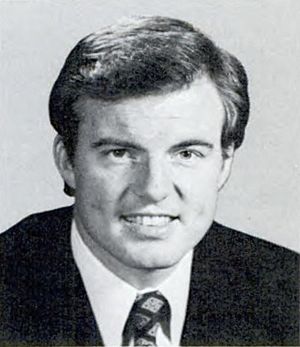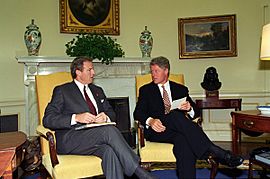Jim Guy Tucker facts for kids
James Guy Tucker Jr. (June 13, 1943 – February 13, 2025) was an American politician, businessman, and lawyer. He served as the 43rd Governor of Arkansas from 1992 until he stepped down in 1996 due to legal issues related to a business investigation. A member of the Democratic Party, he also served as lieutenant governor, state attorney general, and a U.S. representative.
Quick facts for kids
Jim Guy Tucker
|
|
|---|---|

Portrait of Tucker, 1977
|
|
| 43rd Governor of Arkansas | |
| In office December 12, 1992 – July 15, 1996 |
|
| Lieutenant | Mike Huckabee |
| Preceded by | Bill Clinton |
| Succeeded by | Mike Huckabee |
| 15th Lieutenant Governor of Arkansas | |
| In office January 15, 1991 – December 12, 1992 |
|
| Governor | Bill Clinton |
| Preceded by | Winston Bryant |
| Succeeded by | Mike Huckabee (1993) |
| Member of the U.S. House of Representatives from Arkansas's 2nd district |
|
| In office January 3, 1977 – January 3, 1979 |
|
| Preceded by | Wilbur Mills |
| Succeeded by | Ed Bethune |
| 49th Attorney General of Arkansas | |
| In office January 9, 1973 – January 3, 1977 |
|
| Governor | Dale Bumpers David Pryor |
| Preceded by | Ray Thornton |
| Succeeded by | Bill Clinton |
| Personal details | |
| Born |
James Guy Tucker Jr.
June 13, 1943 Oklahoma City, Oklahoma, U.S. |
| Died | February 13, 2025 (aged 81) Little Rock, Arkansas, U.S. |
| Resting place | Mount Holly Cemetery, Little Rock, Arkansas |
| Political party | Democratic |
| Spouse |
Betty Allen
(m. 1975) |
| Children | 2 |
| Education | Harvard University (AB) University of Arkansas (JD) |
| Military service | |
| Branch | |
| Years | 1964 |
| Rank | Candidate |
| Unit | Marine Corps Reserve Officer Candidates School |
Contents
Early Life and Education
Jim Guy Tucker was born in Oklahoma City on June 13, 1943. His family moved to Arkansas before he started school. He attended public schools in Little Rock and graduated from Hall High School in 1961.
While in high school, he became involved in politics by being elected vice-president of Key Club International. This is a large and old service organization for high school students. After high school, he earned a Bachelor of Arts degree from Harvard University in 1964.
Early Career Paths
Military Service and Journalism
In 1964, Tucker served in the United States Marine Corps Reserve. He was discharged for health reasons after completing the first part of his officer training.
In early 1965, Tucker traveled to Southeast Asia and became a freelance war correspondent in South Vietnam. This meant he reported on the war without working for a specific news organization. He stayed in the war zone until 1967. During this time, he wrote a book called Arkansas Men at War. The book shared interviews with soldiers from Arkansas whom he had followed into combat.
Teaching and Law School
After his time as a correspondent, Tucker briefly worked as an assistant professor of American history at the American University of Beirut in Lebanon. He then returned to the University of Arkansas Law School in 1968. He graduated and became a lawyer that same year.
Law Career Highlights
Prosecutor and Legal Reform
Tucker began his law career at the Rose Law Firm. In 1970, he ran for and became the prosecuting attorney for the Sixth Judicial District of Arkansas, serving from 1971 to 1972. As a prosecutor, he was responsible for bringing legal cases against people accused of crimes. He worked to clear a large number of serious criminal cases that had built up.
He was also appointed to the Arkansas Criminal Code Revision Commission from 1973 to 1975. In this role, he helped lead a major update of the state's criminal laws.
Addressing Public Concerns
Tucker started an investigation into police corruption. Although his initial efforts faced challenges, a later federal investigation, building on his work, led to significant changes in the police department. This included the resignation of the police chief and other officials.
Political Journey
Serving as Attorney General and U.S. Representative
In 1972, at the age of 29, Tucker was elected Arkansas Attorney General. This role involves being the chief legal officer for the state. He served two two-year terms, from 1973 to 1977. During this time, he worked to protect consumers and helped update the state's criminal laws.
From 1977 to 1979, Tucker served one term as a U.S. Representative for Arkansas. In this role, he worked on important committees dealing with topics like Social Security and welfare reform.
Later Political Roles
After leaving Congress, Tucker ran for the United States Senate in 1978 but was not successful. In 1979, President Jimmy Carter appointed him to lead the White House Conference on Families, which focused on issues important to families.
Tucker returned to practicing law. He ran for governor against Bill Clinton in 1982 but was defeated. Eight years later, in 1990, he planned to run for governor again. However, he decided instead to run for lieutenant governor.
Tucker became lieutenant governor and often served as acting governor when Bill Clinton, who was then governor, was traveling outside the state for his presidential campaign. Tucker officially became governor on December 12, 1992, after Clinton was elected president and resigned from his state role.
As governor, Tucker quickly addressed a financial problem with the state's Medicaid system, which helps people with healthcare costs. He proposed a soft drink tax to help fund Medicaid, which voters approved. In 1994, Tucker was elected to a full four-year term as governor.
Stepping Down from Office
In May 1996, Jim Guy Tucker faced legal challenges related to a business investigation known as the Whitewater affair. He was found guilty of certain charges. Because of this, Tucker announced his decision to step down as governor.
His resignation took place on July 15, 1996. Mike Huckabee, who was the lieutenant governor at the time, then became the new governor of Arkansas.
Business Ventures
In the early 1980s, while working as a lawyer, Tucker and his wife Betty started building cable television systems in Arkansas and later in other states. In the early 1990s, Tucker partnered with another company to buy and expand cable TV systems in London.
Later, in the mid-1990s, Tucker and his wife helped create a cable television company in Indonesia. Despite financial challenges, they built and expanded cable TV and internet systems in major Indonesian cities. This company eventually became part of AcrossAsia Multimedia Ltd., which was listed on the Hong Kong stock exchange.
Personal Life and Health
In 1975, Jim Guy Tucker married Betty Allen. They had two children together, and he also became a stepfather to her two children from a previous marriage.
Health Challenges and Passing
Since his college years, Tucker had a serious autoimmune disease that affected his liver. This condition caused him significant health problems. In December 1996, he received a liver transplant at the Mayo Clinic in Minnesota.
Jim Guy Tucker passed away on February 13, 2025, at the age of 81, in a Little Rock hospital. His death was due to complications from a long-term health condition. His funeral was held in Little Rock, and he was buried at Mount Holly Cemetery.
Lasting Impact
In 2012, Tucker donated his personal and political papers to the University of Arkansas at Little Rock. This collection, known as the James Guy Tucker Jr. Papers, became available to the public in 2017. It helps people learn about his life and career.
As a former governor and U.S. Representative, Tucker was honored after his death. His body was placed in the Arkansas State Capitol building on February 21, 2025, for people to pay their respects. State flags were also lowered to half-staff from February 19 to February 24, 2025.
See also
 In Spanish: Jim Guy Tucker para niños
In Spanish: Jim Guy Tucker para niños
 | James Van Der Zee |
 | Alma Thomas |
 | Ellis Wilson |
 | Margaret Taylor-Burroughs |


